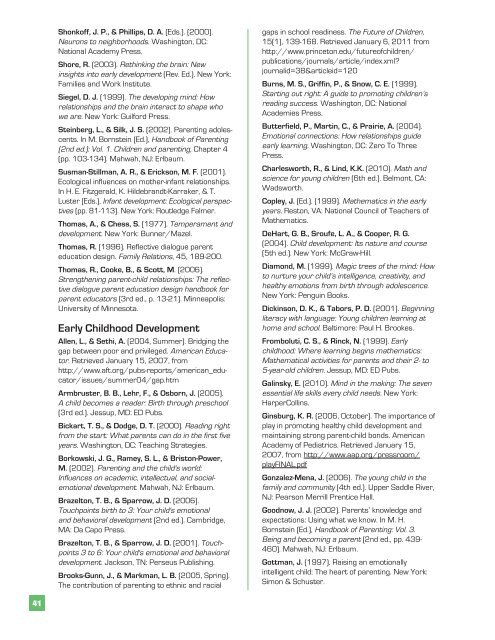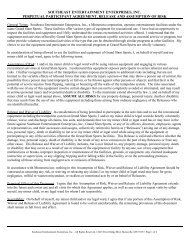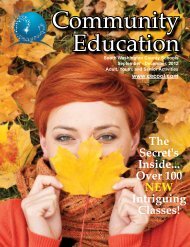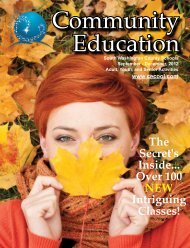Parent Education Core Curriculum Framework 2011.pdf - mnafee
Parent Education Core Curriculum Framework 2011.pdf - mnafee
Parent Education Core Curriculum Framework 2011.pdf - mnafee
You also want an ePaper? Increase the reach of your titles
YUMPU automatically turns print PDFs into web optimized ePapers that Google loves.
Shonkoff, J. P., & Phillips, D. A. (Eds.). (2000).<br />
Neurons to neighborhoods. Washington, DC:<br />
National Academy Press.<br />
Shore, R. (2003). Rethinking the brain: New<br />
insights into early development (Rev. Ed.). New York:<br />
Families and Work Institute.<br />
Siegel, D. J. (1999). The developing mind: How<br />
relationships and the brain interact to shape who<br />
we are. New York: Guilford Press.<br />
Steinberg, L., & Silk, J. S. (2002). <strong>Parent</strong>ing adolescents.<br />
In M. Bornstein (Ed.), Handbook of <strong>Parent</strong>ing<br />
(2nd ed.): Vol. 1. Children and parenting, Chapter 4<br />
(pp. 103-134). Mahwah, NJ: Erlbaum.<br />
Susman-Stillman, A. R., & Erickson, M. F. (2001).<br />
Ecological influences on mother-infant relationships.<br />
In H. E. Fitzgerald, K. Hildebrandt-Karraker, & T.<br />
Luster (Eds.), Infant development: Ecological perspectives<br />
(pp. 81-113). New York: Routledge Falmer.<br />
Thomas, A., & Chess, S. (1977). Temperament and<br />
development. New York: Bunner/Mazel.<br />
Thomas, R. (1996). Reflective dialogue parent<br />
education design. Family Relations, 45, 189-200.<br />
Thomas, R., Cooke, B., & Scott, M. (2006).<br />
Strengthening parent-child relationships: The reflective<br />
dialogue parent education design handbook for<br />
parent educators (3rd ed., p. 13-21). Minneapolis:<br />
University of Minnesota.<br />
Early Childhood Development<br />
Allen, L., & Sethi, A. (2004, Summer). Bridging the<br />
gap between poor and privileged. American Educator.<br />
Retrieved January 15, 2007, from<br />
http://www.aft.org/pubs-reports/american_educator/issues/summer04/gap.htm<br />
Armbruster, B. B., Lehr, F., & Osborn, J. (2005).<br />
A child becomes a reader: Birth through preschool<br />
(3rd ed.). Jessup, MD: ED Pubs.<br />
Bickart, T. S., & Dodge, D. T. (2000). Reading right<br />
from the start: What parents can do in the first five<br />
years. Washington, DC: Teaching Strategies.<br />
Borkowski, J. G., Ramey, S. L., & Briston-Power,<br />
M. (2002). <strong>Parent</strong>ing and the child's world:<br />
Influences on academic, intellectual, and socialemotional<br />
development. Mahwah, NJ: Erlbaum.<br />
Brazelton, T. B., & Sparrow, J. D. (2006).<br />
Touchpoints birth to 3: Your child's emotional<br />
and behavioral development (2nd ed.). Cambridge,<br />
MA: Da Capo Press.<br />
Brazelton, T. B., & Sparrow, J. D. (2001). Touchpoints<br />
3 to 6: Your child's emotional and behavioral<br />
development. Jackson, TN: Perseus Publishing.<br />
Brooks-Gunn, J., & Markman, L. B. (2005, Spring).<br />
The contribution of parenting to ethnic and racial<br />
gaps in school readiness. The Future of Children,<br />
15(1), 139-168. Retrieved January 6, 2011 from<br />
http://www.princeton.edu/futureofchildren/<br />
publications/journals/article/index.xml?<br />
journalid=38&articleid=120<br />
Burns, M. S., Griffin, P., & Snow, C. E. (1999).<br />
Starting out right: A guide to promoting children’s<br />
reading success. Washington, DC: National<br />
Academies Press.<br />
Butterfield, P., Martin, C., & Prairie, A. (2004).<br />
Emotional connections: How relationships guide<br />
early learning. Washington, DC: Zero To Three<br />
Press.<br />
Charlesworth, R., & Lind, K.K. (2010). Math and<br />
science for young children (6th ed.). Belmont, CA:<br />
Wadsworth.<br />
Copley, J. (Ed.). (1999). Mathematics in the early<br />
years. Reston, VA: National Council of Teachers of<br />
Mathematics.<br />
DeHart, G. B., Sroufe, L. A., & Cooper, R. G.<br />
(2004). Child development: Its nature and course<br />
(5th ed.). New York: McGraw-Hill.<br />
Diamond, M. (1999). Magic trees of the mind: How<br />
to nurture your child’s intelligence, creativity, and<br />
healthy emotions from birth through adolescence.<br />
New York: Penguin Books.<br />
Dickinson, D. K., & Tabors, P. D. (2001). Beginning<br />
literacy with language: Young children learning at<br />
home and school. Baltimore: Paul H. Brookes.<br />
Fromboluti, C. S., & Rinck, N. (1999). Early<br />
childhood: Where learning begins mathematics:<br />
Mathematical activities for parents and their 2- to<br />
5-year-old children. Jessup, MD: ED Pubs.<br />
Galinsky, E. (2010). Mind in the making: The seven<br />
essential life skills every child needs. New York:<br />
HarperCollins.<br />
Ginsburg, K. R. (2006, October). The importance of<br />
play in promoting healthy child development and<br />
maintaining strong parent-child bonds. American<br />
Academy of Pediatrics. Retrieved January 15,<br />
2007, from http://www.aap.org/pressroom/<br />
playFINAL.pdf<br />
Gonzalez-Mena, J. (2006). The young child in the<br />
family and community (4th ed.). Upper Saddle River,<br />
NJ: Pearson Merrill Prentice Hall.<br />
Goodnow, J. J. (2002). <strong>Parent</strong>s’ knowledge and<br />
expectations: Using what we know. In M. H.<br />
Bornstein (Ed.), Handbook of <strong>Parent</strong>ing: Vol. 3.<br />
Being and becoming a parent (2nd ed., pp. 439-<br />
460). Mahwah, NJ: Erlbaum.<br />
Gottman, J. (1997). Raising an emotionally<br />
intelligent child: The heart of parenting. New York:<br />
Simon & Schuster.<br />
41





